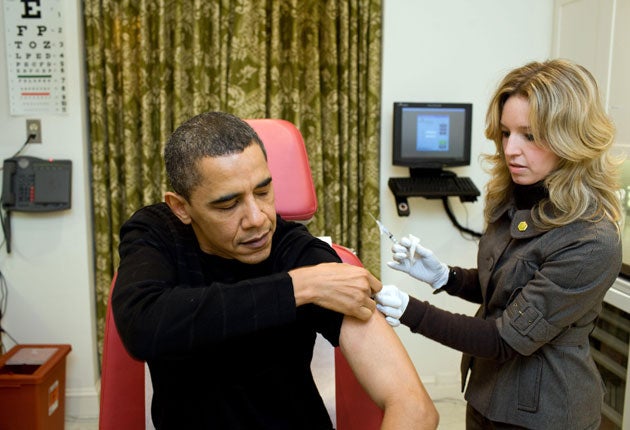US Senate passes landmark health care measure

Your support helps us to tell the story
From reproductive rights to climate change to Big Tech, The Independent is on the ground when the story is developing. Whether it's investigating the financials of Elon Musk's pro-Trump PAC or producing our latest documentary, 'The A Word', which shines a light on the American women fighting for reproductive rights, we know how important it is to parse out the facts from the messaging.
At such a critical moment in US history, we need reporters on the ground. Your donation allows us to keep sending journalists to speak to both sides of the story.
The Independent is trusted by Americans across the entire political spectrum. And unlike many other quality news outlets, we choose not to lock Americans out of our reporting and analysis with paywalls. We believe quality journalism should be available to everyone, paid for by those who can afford it.
Your support makes all the difference.Senate Democrats passed a landmark health care bill in a climactic Christmas Eve vote that could define President Barack Obama's legacy and usher in near-universal medical coverage for the first time in US history.
The 60-39 vote on a cold winter morning capped months of arduous negotiations and 24 days of floor debate. It also followed a succession of failures by past congresses to get to this point.
Vice President Joe Biden presided as 58 Democrats and two independents voted "yes." Republicans unanimously voted "no."
The tally far exceeded the simple majority required for passage, but clearly showed the philosophical split between Democrats and Republicans over how American health care should be delivered.
And that acrimony is expected to persist as the Senate's bill gets merged with legislation passed by the House. That has to happen before Obama can sign a final bill in the new year.
There are significant differences between the two measures but Democrats say they've come too far now to fail. Both bills would extend health insurance to more than 30 million more Americans.
The bill's passage will offer Obama a bright end to an often rocky year that began with huge hopes following his election victory. His public approval level now hovers around 50 percent as he copes with high unemployment, increasing violence in Afghanistan and the divisive health care debate.
Obama delayed his Christmas vacation in Hawaii until the Senate vote, a sign of its importance to his presidency. The legislation will likely shape the 2010 congressional elections and possibly Obama's 2012 re-election bid.
Obama quickly hailed Senate passage of the bill and said his government is now "finally poised to deliver on the promise" of overhauling a troubled system.
He noted that presidents since Theodore Roosevelt in 1912 have been trying unsuccessfully to overhaul medical care.
Obama also repeated his theme that the bill will help end long-criticized insurance industry practices, such as denying coverage for pre-existing conditions.
The Senate bill "includes the toughest measures ever taken to hold the insurance industry responsible," Obama said.
Vicki Kennedy, the widow of the late Massachusetts Sen. Edward Kennedy, who made health reform his life's work, watched the vote from the gallery.
"This morning isn't the end of the process, it's merely the beginning. We'll continue to build on this success to improve our health system even more," Majority Leader Harry Reid said before the vote. "But that process cannot begin unless we start today ... there may not be a next time."
After passage, House Minority Republican Leader John Boehner assailed the bill.
"Not even Ebenezer Scrooge himself could devise a scheme as cruel and greedy as Democrats' government takeover of health care," the Ohio Republican said in a statement.
He complained that the legislation would increase health coverage costs for families and small businesses, raise taxes during a recession and cut into federal health care benefits for the elderly.
"It's no coincidence that the more the American people learn about this monstrosity, the more they oppose it," Boehner said.
The legislation would ban the insurance industry from denying benefits or charging higher premiums on the basis of pre-existing medical conditions. The Congressional Budget Office predicts the bill will reduce deficits by $130 billion over the next 10 years, an estimate that assumes lawmakers carry through on hundreds of billions of dollars in planned cuts to insurance companies and doctors, hospitals and others who treat Medicare patients.
For the first time, the government would require nearly every American to carry insurance, and subsidies would be provided to help low-income people to do so. Employers would be induced to cover their employees through a combination of tax credits and penalties. The legislation costs nearly $1 trillion over 10 years and is paid for by a combination of taxes, fees and cuts to Medicare.
Some liberal Democrats have not been enthusiastic about the Senate bill because they don't believe it goes far enough, leaving some 24 million people uninsured.
And there are no plans for a government-run national health care system that would cover all Americans. Even a more modest proposal to have a government-run health plan compete with private insurers had to be stripped from the Senate bill in the face of opposition from moderate Democrats.
Negotiations between the House and Senate to reconcile differences between the two bills are expected to begin as soon as next week.
Join our commenting forum
Join thought-provoking conversations, follow other Independent readers and see their replies
Comments